Welcome back to PART 3 of Making 2022 You Best Year Ever with EPISODE #193 on “Making Your Goals Automatic by Putting Autosuggestion into Practice with Your Imagination“ as we continue our deep dive into Napoleon Hill’s Classic book, Think and Grow Rich, that has sold over 15 million copies worldwide.
On this episode, you will learn:
✔︎ Review PART 1 and 2 to Reinforce the First 3 Chapters of Think and Grow Rich.
✔︎ Chapter 4: How to Use Autosuggestion to Set Your Goals on Autopilot.
✔︎ Chapter 5: Why We Must Acquire and Know How to Use Specialized Knowledge to Reach High Levels of Success
✔︎ Chapter 6: Why Imagination is Everything.
For those new, or returning guests, welcome back to Season 7 of our Podcast. I'm Andrea Samadi, author, and educator from Toronto, Canada, now in Arizona, and like many of you who tune in, have been fascinated with learning, understanding, and applying the most current brain research to improve productivity in our schools, our sports, and workplace environments. This month, I decided to share my notes with you on a book that I have been studying every January since 2018, with Paul Martinelli, who has studied this book for most of his career. It was the book that my mentor Bob Proctor has studied for his entire life, over 57 years, and a book that some of the wisest people in the world have studied.
If you have been following our episodes of Napoleon Hill’s Classic book, you will recall how PART 1 began with a reminder from Grant Cardone that “in order to get to the next level of whatever it is that you are doing, you must think and act in a wildly different way than we previously have been.”[i] We outlined all of the 15 principles that we will be diving into and in PART 2 we looked at the importance of positive thinking, being crystal clear with what we want, and choosing faith over fear in pursuit of our goals.
Before I began recording these episodes, I didn’t know how many it would take to cover these chapters thoroughly, but if you are like me, and just want to learn, keep listening and see if you can add anything new to your goal-setting/achieving process. We really could keep going all year, as each principle we could talk about for an entire month. Therefore, I think it’s important to revisit this book, every year, as we are working on new goals, to continue to improve our own process, and take our understanding of each principle, to a new level.
Whatever it is you are working on—a new job or position at work, or smaller steps to a huge vision that you have, it’s normal to be skeptical of anything new, especially when the ideas are so abstract. At first glance the title of this book sounds crazy. Think and Grow Rich! Sounds a bit out there. The only reason I am covering this book on this podcast, is because it is such a classic, and has the ability to challenge anyone’s “thinking” and the principles have been used successfully from some of the wisest people in the world.
I have met many people while working in the speaking industry who had successfully created beautiful lives with these principles, and they kept coming back to deepen their study, awareness and understanding. It’s a process. When I read about how Jim Carrey[ii] used these ideas when he first came into the film industry, visualizing his first $10M check, I wasn’t surprised at all.
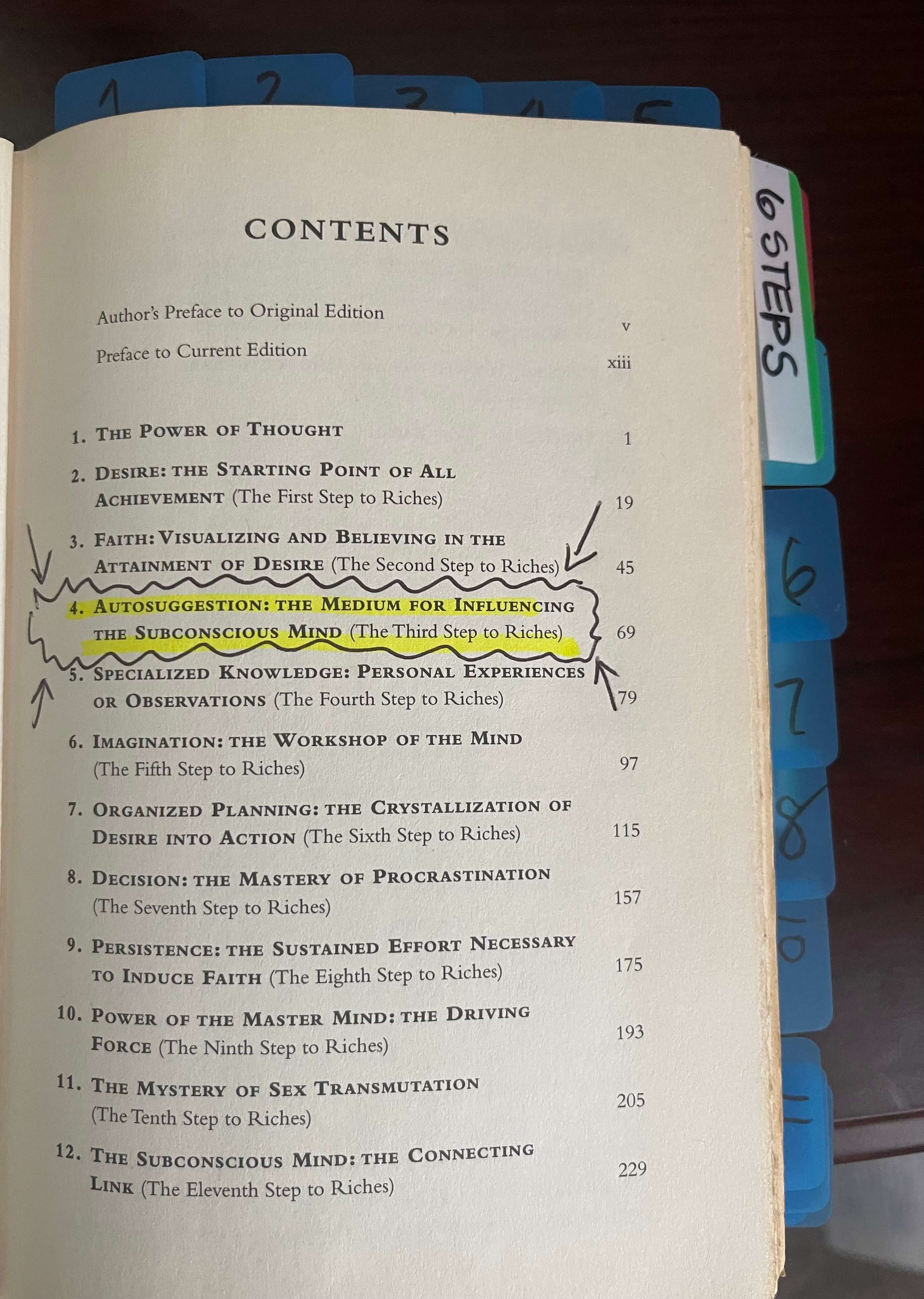 For this episode we will move into chapter 4 on Autosuggestion, Chapter 5 on Specialized Knowledge, and Chapter 6 on Imagination. What I’m noticing is how these chapters all work together, like my mentor Proctor says, “like the colors of the rainbow” as we think back to PART 1 of this book study and remember this whole process began with the realization that we must think about what we want (or desire as Hill would say) with a high degree of clarity, increasing our awareness of the world, adding an unwavering belief and expectation around the attainment of what we want, (by choosing faith over fear, overcoming all obstacles) and then put this worthy goal on autosuggestion by repeating the 6 steps from the Desire Chapter twice a day (reading and writing out our vision).
For this episode we will move into chapter 4 on Autosuggestion, Chapter 5 on Specialized Knowledge, and Chapter 6 on Imagination. What I’m noticing is how these chapters all work together, like my mentor Proctor says, “like the colors of the rainbow” as we think back to PART 1 of this book study and remember this whole process began with the realization that we must think about what we want (or desire as Hill would say) with a high degree of clarity, increasing our awareness of the world, adding an unwavering belief and expectation around the attainment of what we want, (by choosing faith over fear, overcoming all obstacles) and then put this worthy goal on autosuggestion by repeating the 6 steps from the Desire Chapter twice a day (reading and writing out our vision).
If I were to want to STOP and FREEZE at any moment of these 15 principles, it would be right here, with the importance of understanding chapter 4 on autosuggestion because if we think about it, for anyone who has attained ANY level of success in their life, it began in their mind first and is best said with this poem by Walter D. Wintle.
“If you think you are beaten, you are
If you think you dare not, you don't,
If you like to win, but you think you can't
It's almost a cinch you won't.
If you think you'll lose, you've lost
For out in the world we find,
Success begins with a fellow's will
It's all in the state of mind.
I’m really starting to think that the “secret” in these pages lays somewhere with our ability to “think” and now Hill introduces the term autosuggestion or a way of self-conditioning our non-conscious mind.
Sounds deep, but exciting, at least I think it is. I’m sure this is why this book is the #6th bestselling book on Amazon, but I wonder how many people read the book this way and put this much thinking into each chapter. I definitely didn’t until Paul Martinelli walked me though each chapter of the book.
REVIEW WHAT WE’VE LEARNED in PART 1 and PART 2 to reinforce what we’ve covered before adding a new layer.
- KNOW WHAT WE WANT: Begin with identifying what you really want. Clearly defined goals written as if you have already attained your goal. I’m so happy and grateful now that---and write out what you want by a certain date.
- ADD FEELINGS AND EMOTIONS: Engage your emotions, feelings, and expectation which has a magical power that continues to drive what you are seeking, towards you, and you towards it.
- GET YOUR SENSES INVOLVED: Use all of your 5 senses to see yourself in attainment of your goal, feel it, even put something in your physical surroundings that you can touch like I did years ago when I put a small cactus in my room in Toronto, to help me to visualize moving to this new location. This small cactus helped me to imagine (beyond my senses) the beautiful landscape and mountains of AZ when I looked outside of my window in Toronto, and could only see snowbanks, frost and icicles.
- THE POWER OF REPETITION: Write and repeat what you want twice a day, with whatever method works for you. Grant Cardone uses a legal notepad, I read my goals out from where they are written on my wall, and write them on a notepad, and have seen others using letterboards where they have to take the time to write out their goals using letters, or whiteboards they can write on and erase their every day.
- ACT AS IF WHAT YOU WANT IS YOURS: When someone asks you what you are working on, your language is imperative for the direction of where you are going. Do you say “I’m trying for xyz” or “I’m in the process of achieving xyz” that gives a whole different level of confidence. Whenever I hear someone say they will “try” something, it’s a clear indicator it’s not even on their radar. There’s no such thing as “try.” You are either doing something, or you’re not.
- CHOOSE FAITH OVER FEAR: When you keep moving, past all obstacles, you will notice that new people, circumstances and situations will come your way to help you. There is no such thing as “something for nothing.” This only comes with hard work and perseverance.
Which leads us to the next step in the process with Chapter 4: Autosuggestion or “Self-Suggestion” (Chapter 4, Page 69, TAGR).
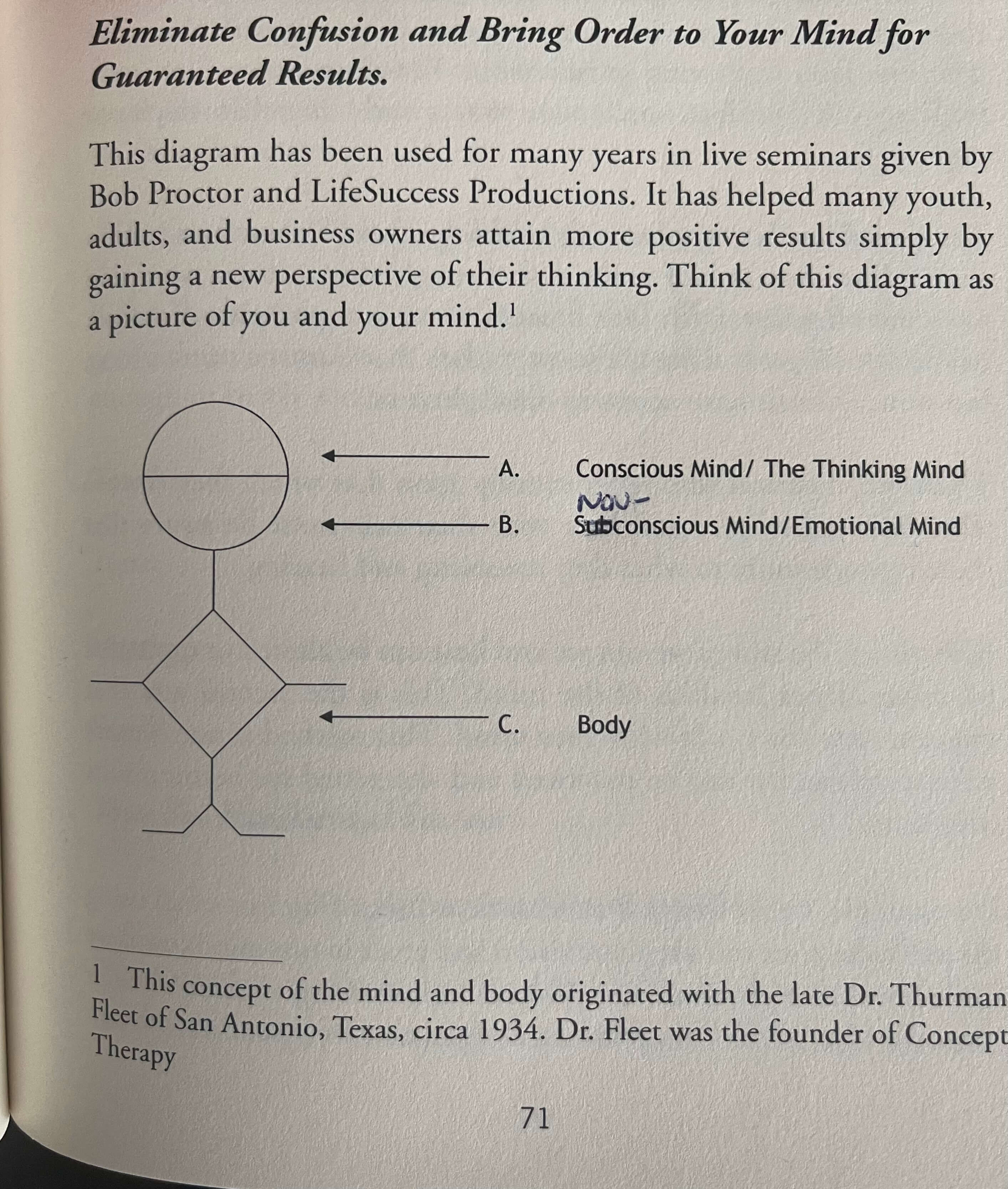
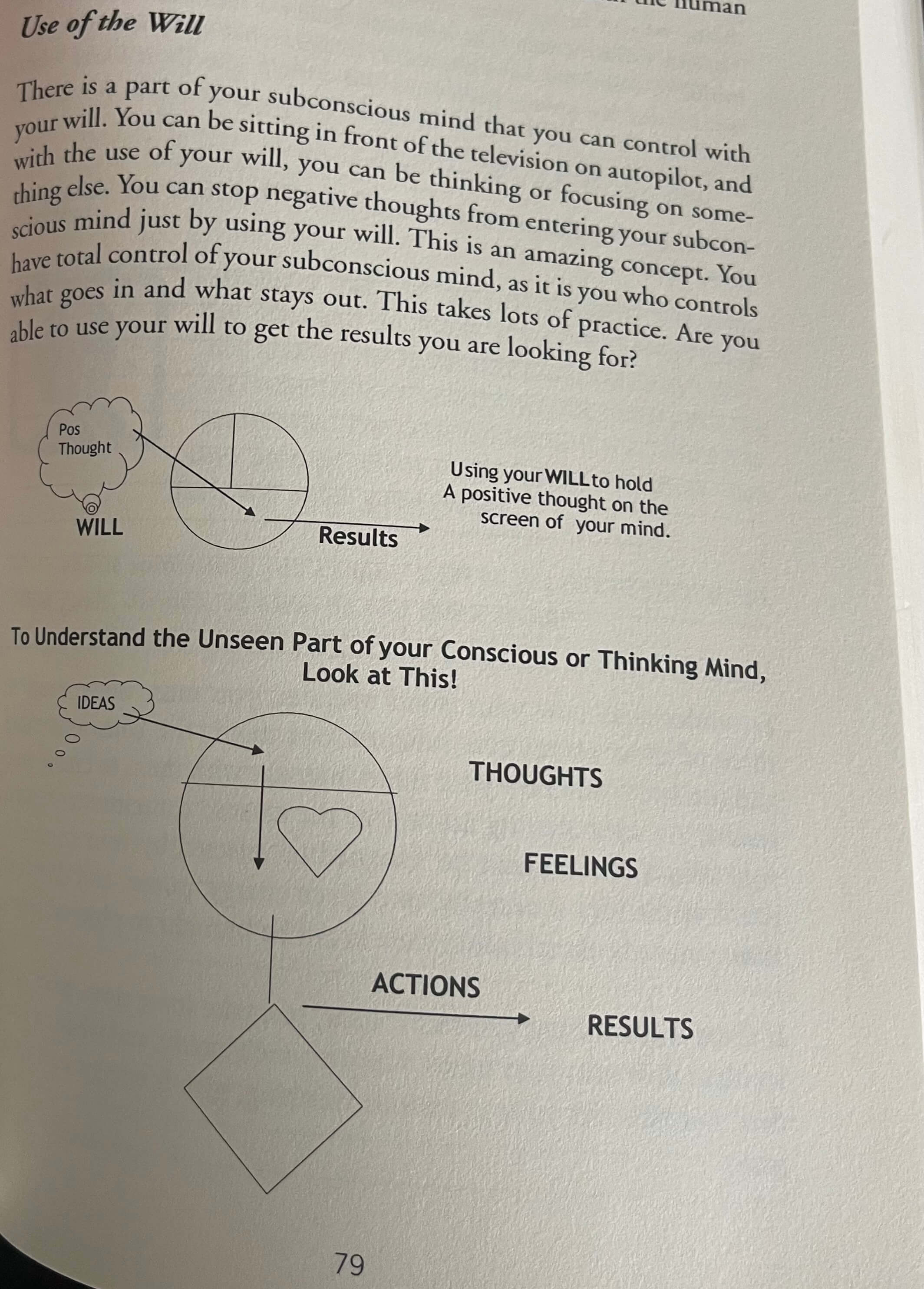
This chapter is best described with a quick lesson on how the mind works. I first wrote about this in my first book, The Secret for Teens Revealed[iii] (page 71) Lesson 2: What is Your Mind?
I first learned this concept while working with Proctor in the seminar industry, and it really did change the way that I think. The idea of creating order in our mind with the image of the stickperson originated from Dr. Thurman Fleet in 1934 and is a way of thinking of our mind. If you look at the image in the show notes labelled A, B and C of the stickperson.
Our conscious mind (A) in the diagram, is the part of our mind that we use when we are consciously doing something like reading, studying, learning, solving problems, or playing sports.
***Non-Conscious Mind (B)[iv] is the part of our mind that accepts whatever enters it. This is an extremely powerful concept and since I learned this BEFORE I had children, I was very careful of not playing the news around the kids, even when they were babies. We know that watching and listening to the negativity on the news is not good for us, as it all seeps into our mind when it’s in this submissive state (or a baby’s mind that is wide open to whatever you put into it) and this can change how we feel. That’s because what we are hearing is going right into our non-conscious mind and impacting our body and in turn, as adults, impacting our results. If you have young children, you can use this to their advantage by guarding their mind from negativity and adding positivity when you can, by whispering in their ear before they go to bed at night something powerful like “you will achieve all of your goals and live a wonderful happy life” as you send them off to sleep. Always be mindful of what you have playing in the background of your home. With this principle of autosuggestion, it really does matter.
It’s also important to think about this when we sit down to eat. Our mind goes into a submission state, when it’s not thinking, and anyone else’s negative thoughts can go straight into our non-conscious mind. It’s very important that we are careful who we surround ourselves with, as their thoughts can impact our mood, for this reason.
We have all “felt” this happen, and this image explains why.
Our Body (C): I know that you will know that our thinking and attitude can impact our health, since our body inherits what our mind expresses. Healthy thoughts, put our body in the best environment for health and conversely, when we dwell on negative situations, that can stress our body and can cause dis-ease. A healthy dose of optimism can go a long way with coping with life’s stressful situations.
Just by looking at the stickperson diagram, we can see how autosuggestion is one way to access our non-conscious mind so that we must be in integrity of what we are thinking, and feeling, creating the results we want. When our thoughts and feelings are lined up, it’s called PRAXIS and is the first step towards putting this principle into action. By repeating your goals twice a day, eventually, with time, you will believe what you are saying, build faith, and it’s the belief mixed with faith that will drive your behavior moving forward.
REVIEWING YOUR HIGHER FACULTIES:
Before we move onto the next chapter, Chapter 5, on Specialized Knowledge, I think it’s important to bring up one of the BIG IDEA’S I learned from working with Bob Proctor, who has been reading this book for his entire life (over 57 years). If you go back and listen to EPISODE #67[v], you will see BIG IDEA #4 where I explain the importance of learning to live beyond our 5 senses (or what we can see, hear, smell, taste and touch) that can be limiting. We can access new information, deeper flashes of insight, higher levels of creativity, if we learn to live with our 6 intellectual faculties that operate beyond our 5 senses for a competitive advantage. Napoleon Hill thought that intuition (or the sixth sense as he calls it) and imagination are so important that he added them to his chapters or principles that we will dive into in later episodes.
Intuition is a mental tool that gives us answers, by picking up the energy or feeling from another person or situation. Sometimes we feel we just know the answer, or we have a gut feeling. That is our intuition at work, and we must learn to develop and listen to it. With practice, we can learn to trust our intuition and become confident with that which we feel or know. Then, we can move confidently toward that which we want without any doubt, because we’ve used this higher faculty that instills a level of trust within ourselves.
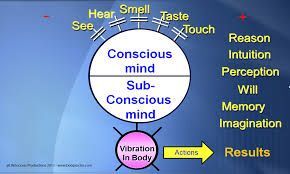
Chapter 5-Specialized Knowledge
To further hone in on what we want, chapter 5 reminds us to add an understanding of specialized knowledge which separates you from everyone else, making you special with the knowledge you have acquired. In chapter 5 we learn that knowledge (general or specialized) must be “organized and intelligently directed” (CH 5, page 79, TAGR) “and is only potential power. It becomes power only when, and if it is organized into definite plans of action and directed to a definite end.”
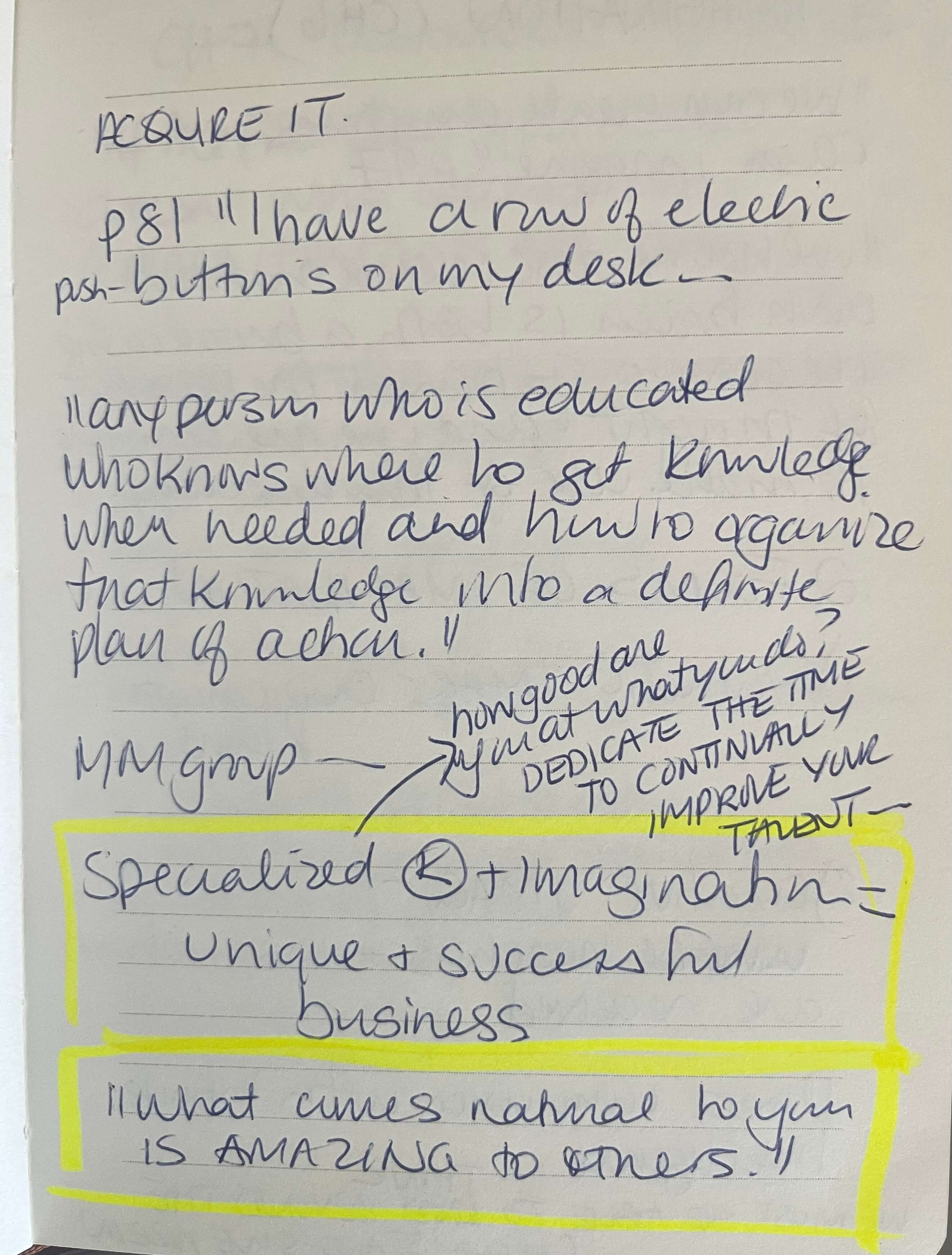
This makes sense when we think about everything we learn in school (general knowledge) that has no use unless we apply and use it in some way (specialized). Hill explains this is the “missing link in all systems of education … the failure of educational institutions to teach their students HOW TO ORGANIZE AND USE KNOWLEDGE AFTER THEY ACQUIRE IT.” (CH 5, Page 80, TAGR).
Henry Ford even said that he has a row of buttons on his desk that he can push to find out answers to anything he wants (general knowledge) and that any “person is educated who knows where to get knowledge when needed, and how to organize that knowledge into definite plans of action. Through the assistance of his Master Mind, Henry Ford had at his command all the specialized knowledge he needed to enable him to become one of the wealthiest men in America.” (Ch.5, Page 81, TAGR).
If you think about this principle and what it means, I think about why some books become best sellers, and others are still great, but are missing something. Think about Stephen Covey’s 7 Habits of Highly Effective People that we covered on EPISODE #68[vi] on The Neuroscience of Personal Change. Why was Covey’s book so successful and named the number 1 most influential book of the 20th century, selling more than 40 million copies in 50-plus languages[vii]. I think one of the reasons was that it contained specialized knowledge (The 7 Habits) in a framework that showed us how to organize and use it, after we read the book.
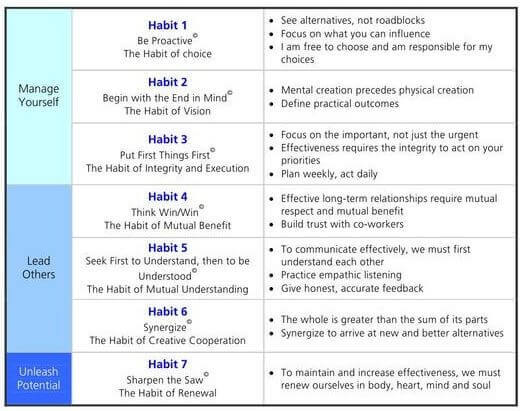
We are taught what to do with each habit, with clear steps on how to implement this new and specialized knowledge into our life to manage ourselves, and others. Next, think about another book, Eckhart Tolle’s The Power of Now[viii] that might still be an incredible book, but it was missing something. If you have read this book, you might be able to recall something about it, or that Tolle worked with Oprah on a series to teach these concepts, or you might remember specifics about the book, but was there a framework to help you to apply what the book was teaching us? Can you remember anything about it? There were incredible lessons in this book, but they were not organized in a framework to help people to use and apply them.
“Knowledge is not power until it becomes organized in definite plans and action.” (Ch 5, Page 80, TAGR) and Hill reminds us that just because Henry Ford had little formal education, it didn’t mean that he was not “educated.” The word educate comes from the Latin word “educo” that means to “educe, to draw out, to develop from within. An educated person is not necessarily one who has an abundance of general or specialized knowledge. Educated people have developed the faculties of their mind (that we reviewed with BIG IDEA #4 above) so that they may acquire anything they want, or its equivalent, without violating the rights of others.” (CH 5, Page 80, TAGR).
How to Use Specialized Knowledge to Reach New Heights?
How good are you at what you do? Are you continually looking to improve your talent? When you can take someone who has developed their talent in a way that comes natural to you, but amazes others, you have developed something unique. This must be improved, honed and further developed to continue to grow, expand and meet with success. Do you see how each principle in this book is a part of a formula? It’s a process…
Be sure that whatever your idea or goal is, that you continue to grow and refine it, adding more and more specialized knowledge to what you are building, which brings us to the last piece of the formula in this episode.
Chapter 6-Our Imagination.
The final part of this episode is when we add our imagination to the mix, to think beyond what we can see, and into the unknown world where our unattained vision lays.
Imagination is Everything[ix] according to author Earl Nightingale. All great inventions are created in two separate places: the mind of the inventor and the physical world when the inventor creates it. Our lives reflect how well we use our imagination, because when we hit one plateau of success, it will be our imagination that will take us to what’s next. When we create our crystal-clear vision, that we read and write twice a day, we are activating our imagination to do this. When we write and read our vision in detail it activates cells of recognition in our brain that when we imagine what we write, eventually our brain will accept and recognize what we are telling it, and it will go from feeling like a crazy pipe dream, to eventually something that you can see yourself doing. Then one day, what you imagined, becomes your reality.
Think of all the inventions over the past 50 years that changed how we live our lives. Someone had to think of how the world has changed in the past 10 years with the image in the show notes showing how Amazon has almost no stores, Uber owns almost no cars, Facebook creates no content, Airbnb owns no real estate, Netflix is not a TV channel and Bitcoin has no physical coins. All of these ideas began in someone’s imagination, and are transforming the world.
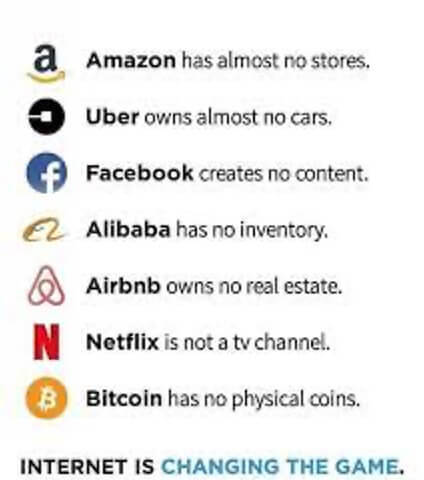
Did you know that in 2020, Jeff Bezos’ annual salary from Amazon was “$81, 840 which qualities as middle-income wage in his home state of California.”[x]
Bezos’ increase in wealth came in 2020 mostly from Amazon stock prices. He is now said to “make more in one second than most people make in one week. He makes about $8.9 billion per month, $2.5 billion per week, or $321 million per day”[xi]
Which brings us to one of the most famous quotes of this book. Napoleon Hill writes “If you are one of those people who believe that hard work and honesty will bring you riches, perish the thought. It is not true. Riches, when they come in huge quantities are never the result of hard work! Riches come, if they come at all, in response to definite demands, based on the application of definite principles, and not by change or luck.” (Chapter 6, Page 108, TAGR).
I’m sure we can all see how the Pandemic causes many of us to shop online, which meant there was a demand for what Bezos had created and Bezos was prepared and ready when this demand hit and I’m sure he had a clear pathway for his vision that wanted to build.
REVIEW OF PART 3
To sum up this episode, and prepare for Chapter 7 on Organized Planning, Chapter 8 on Decision, and 9 on Persistence, don’t forget to review the important steps in PART 1 and 2 that we went over in the past 2 episodes.
Next,
- Review how our mind thinks: with the concept of the stick person so we can see how repeating and writing out our goals is an easy way to put them on autosuggestion.
- Learn to live beyond our five senses: (or what we can see, hear, smell, taste and touch) that can be limiting. Revisit episode #67 and pay attention to the definition of intuition and imagination, since Hill felt they were important enough to list both of these in his 15 principles.
- Keep Learning: by thinking of how you will continue to acquire and organize specialized knowledge that will take you to new levels with your craft.
- Let Your Imagination Soar: Hill suggests reading the entire book first but coming back to this chapter “to put your imagination to work” (Ch. 6, Page 100, TAGR).
Remember this is all a part of a process. If it seems like there are many ideas stacked together, just keep reading, and thinking and each time you put in some more thought to the potential of these ideas, your awareness will expand, giving you a new level of confidence for whatever you are working on.
See you in a few days with the next 3 chapters.
FOLLOW ANDREA SAMADI:
YouTube Channel: https://www.youtube.com/c/AndreaSamadi
Website https://www.achieveit360.com/
LinkedIn: https://www.linkedin.com/in/samadi/
Facebook: https://www.facebook.com/Achieveit360com
Neuroscience Meets SEL Facebook Group https://www.facebook.com/groups/2975814899101697
Twitter: https://twitter.com/andreasamadi
Instagram: https://www.instagram.com/andreasamadi/
RESOURCES:
Chapter 4: Autosuggestion Published on YouTube July 28, 2018 https://www.youtube.com/watch?v=iYOc329tEYQ
Chapter 5: Specialized Knowledge Published on YouTube July 28, 2018 https://www.youtube.com/watch?v=MV9KVZ0sQ7Q
REFERENCES:
[i] Neuroscience Meets Social and Emotional Learning Podcast EPISODE #190 PART 1 “Making 2022 Your Best Year Ever” https://andreasamadi.podbean.com/e/think-and-grow-rich-book-review-part-1-how-to-make-2022-your-best-year-ever/
[ii] What Oprah Learned from Jim Carrey October 12, 2011 https://www.oprah.com/oprahs-lifeclass/what-oprah-learned-from-jim-carrey-video
[iii] The Secret for Teens Revealed by Andrea Samadi, Published September 15, 2008 https://www.amazon.com/Secret-Teens-Revealed-Teenagers-Leadership/dp/1976820030
[iv] ***If you have heard of the term sub-conscious mind used where I say non-conscious, it’s just because I have substituted non-conscious as a more recent term for what we used to call the subconscious mind.
[v]Neuroscience Meets Social and Emotional Learning Podcast EPISODE #67 “Expanding Your Awareness with a Deep Dive into Most Important Concepts Learned from Bob Proctor Seminars: https://andreasamadi.podbean.com/e/expanding-your-awareness-with-a-deep-dive-into-bob-proctors-most-powerful-seminars/
[vi]Neuroscience Meets Social and Emotional Learning Podcast EPISODE #68 “The Neuroscience of Personal Change: With Stephen R. Covey’s 7 Habits of Highly Effective People” https://andreasamadi.podbean.com/e/the-neuroscience-of-personal-change/
[vii] How Stephen Covey’s The 7 Habits Guides Leaders in Times of Challenge and Uncertainty by Marcel Schwantes, https://www.inc.com/marcel-schwantes/stephen-covey-the-7-habits-of-highly-effective-people-leaders.html
[viii] The Power of Now by Eckert Tolle August 1, 2004 https://www.amazon.com/Power-Now-Guide-Spiritual-Enlightenment/dp/1577314808
[ix] Imagination is Everything YouTube by Earl Nightingale https://www.youtube.com/watch?v=e25hRhKPm4M
[x] Mind-Blowing Facts About Jeff Bezos’ Wealth Published July 27, 2021 by Dawn Allcot https://www.yahoo.com/now/5-mind-blowing-facts-jeff-182204262.html?guccounter=1&guce_referrer=aHR0cHM6Ly93d3cuZ29vZ2xlLmNvbS8&guce_referrer_sig=AQAAABJswqzQ-kSEQG-_kMdVZLAFZZRj0X13NDhrKwPFWjvxnht_QzHjo0yPUi5ydMf8G33y7o8SmqRJeHTVTOo3ADKOGRmSXd2d5DGyWiTinM0qb-IoVUVzkXxHpDA0NIvj8BS3hF9mHF5OGCxjC8Fuf_ikfLkGkmENcWHExq_zvzrR
[xi] IBID
No comments yet. Be the first to say something!